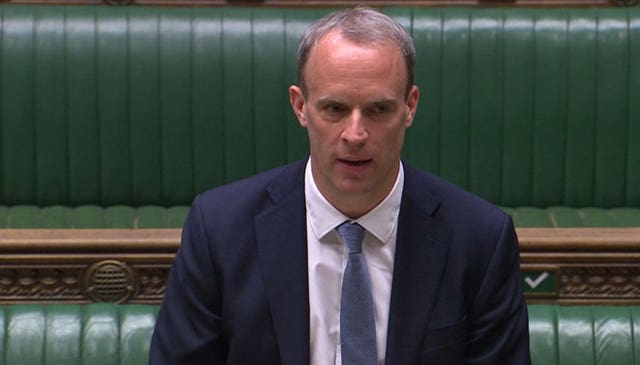Russia and the UK are at odds amid reports Moscow attempted to influence the Scottish independence vote and tried to steal details of research into coronavirus vaccines.
Ahead of the publication of a long-awaited report from an investigation into alleged Russian interference in British democracy, the PA news agency answers some key questions about the latest developments in a complicated relationship.
– What is the report?
Sometimes dubbed the “Russia report”, after months of delays it will be published on Tuesday by the Intelligence and Security Committee.
It is based on secret material from Britain’s intelligence agencies and is expected to outline the threat Russia poses to the UK as well as efforts to counter it.
Its publication was delayed by Boris Johnson calling a general election and by the need to re-establish the committee.
– What are the findings likely to be?
The Daily Telegraph has reported the probe found “credible open-source commentary that Russia undertook to influence the campaign on Scottish independence” in 2014.
But the paper added the 18-month investigation did not find Moscow played any part in the 2016 Brexit vote.
Foreign Secretary Dominic Raab has claimed it was “almost certain” Russia tried to interfere in the 2019 general election.

– What happened in 2019?
Mr Raab said last week that “Russian actors” had tried to influence the 2019 contest by “amplifying” stolen Government papers online.
The documents, relating to US-UK trade talks, were picked up by then Labour leader Jeremy Corbyn to back his claims the Conservatives were preparing to “sell off” the NHS.
After Labour highlighted the documents at a press conference in November, Reddit – an online discussion site – said its own investigation had linked the appearance of the documents to a previous Russian disinformation campaign.
The papers were believed to have appeared online some months earlier but attracted little attention until picked up by the Labour campaign.
– How did Russia respond to that allegation?
The Russian Embassy in London said the nation “has not and will never interfere in the internal affairs of the United Kingdom, especially in the context of democratic elections”.
Russia’s ambassador to the UK, Andrei Kelin, told BBC1’s The Andrew Marr Show “we do not interfere at all”.
He said: “We do not see any point in interference because for us, whether it will be (the) Conservative Party or Labour’s party at the head of this country, we will try to settle relations and to establish better relations than now.”
– How are relations now?
Relations between the UK and Russia have been under severe strain since the Salisbury Novichok poisoning in 2018, which left former double agent Sergei Skripal and his daughter Yulia in hospital and led to the death of Dawn Sturgess.
The incident resulted in Russian diplomats being expelled from Britain by then prime minister Theresa May.
Mr Raab also announced this month, in a move that irked President Vladimir Putin’s administration, that he was imposing sanctions on 25 Russian nationals linked to the death in custody of lawyer Sergei Magnitsky, who died in 2009 after exposing massive corruption in the Interior Ministry.
📺 Ambassador Andrei #Kelin answered @AndrewMarr9's questions on @BBCPolitics #AndrewMarrShow. Watch it in full here: https://t.co/mewDyma3C0
— Russian Embassy, UK (@RussianEmbassy) July 19, 2020
– And what was that about attempts to steal coronavirus vaccine research?
Britain, the US and Canada have claimed Russian intelligence-linked hackers tried to steal details of research into coronavirus vaccines.
It was alleged a group of hackers, known as the Dukes or Cozy Bear, had targeted research bodies around the world – including in the UK.
Security Minister James Brokenshire said the National Cyber Security Centre was 95% certain cyber attacks against labs developing a Covid-19 vaccine were carried out by the Russian state.
– How did Moscow respond to that?
Ambassador Kelin told Andrew Marr he did not “believe in this story at all, there is no sense in it”.
He added: “I learned about their (the hackers) existence from British media. In this world, to attribute any kind of computer hackers to any country, it is impossible.”
Mr Kelin claimed Russian officials had actually discovered “several cyber attacks” originating from UK territory during the country’s recent constitutional referendum which paved the way for President Vladimir Putin to remain in power till 2036.




Comments: Our rules
We want our comments to be a lively and valuable part of our community - a place where readers can debate and engage with the most important local issues. The ability to comment on our stories is a privilege, not a right, however, and that privilege may be withdrawn if it is abused or misused.
Please report any comments that break our rules.
Read the rules hereLast Updated:
Report this comment Cancel